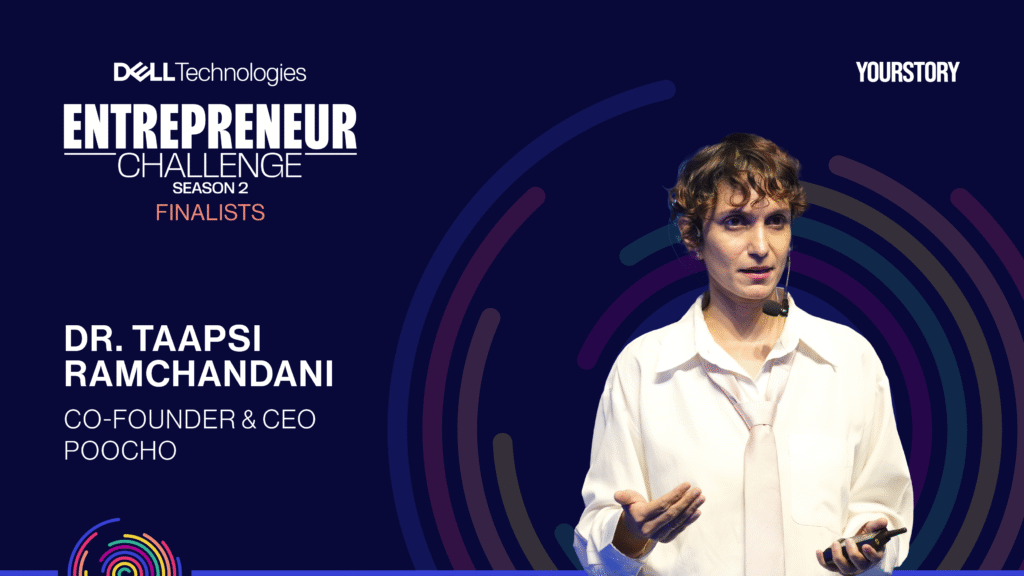
Most startups try to automate or scale. But Poocho set out to do something trickier: speed up qualitative research without sacrificing depth.
That mission has taken the Pune-based restech company from a PhD field notebook to becoming one of the top finalists at the Entrepreneur Challenge Season 2, presented by Dell Technologies and powered by YourStory, to spotlight India’s new promising entrepreneurial talents.
Poocho’s pitch was simple yet powerful: in a world overloaded with metrics, charts, and sentiment scores, the most valuable insights often come not from numbers, but from stories, real conversations, and carefully analyzed thoughts.
The company is building India’s first full-stack qualitative research platform, equipping product, UX, and marketing teams to source participants, conduct multilingual live interviews, transcribe and translate responses, and surface thematic patterns using AI. It’s research, made smarter and faster, but still deeply human.
“Most of you reading this have probably never heard of qualitative research, or if you have, you probably can’t imagine what it has to do with a technology company,” said Dr. Taapsi Ramchandani, co-founder and CEO of Poocho.”
From academia to AI
The story of Poocho began far from pitch decks and funding rounds. In 2016, while on a summer internship at FactSet, Ramchandani—then a doctoral candidate in anthropology—applied her ethnographic training to help build user personas for a new design project. The experience was eye-opening.
“It planted the seed of entrepreneurship,” she recalls. It also marked her first collaboration with her brother Aakarsh Ramchandani, now Poocho’s co-founder and product advisor.
By 2020, as she completed her PhD, Poocho had been incorporated. In its earliest avatar, it was a research agency offering hands-on qualitative studies. But over time, as client needs grew and delivery cycles tightened, the team pivoted from services to product, building tools to reduce friction, speed up workflows, and open up insights to a broader range of teams.
Under the leadership of co-founder and technologist Yogitha Paladugu, Poocho has evolved into a platform that scales data collection effectively while maintaining the essence of qualitative work.
Building a full stack, the hard way
Poocho’s biggest differentiator is its full-stack approach. Rather than offering partial solutions, like just transcription or survey hosting, it owns the entire qualitative journey.
“To truly solve for speed, we needed to control the entire supply chain,” said Ramchandani.
Instead of building isolated features, the team took on the harder task of designing an end-to-end system. The goal wasn’t just functionality; it was reducing turnaround time without compromising depth. That meant investing in every link, from participant recruitment to AI modeling. It’s a bold move in a space where many solutions prioritize scale over depth, but one that gives Poocho an edge in both flexibility and speed.
What also sets the startup apart is who’s behind the platform. Unlike many tech-first products, Poocho is developed and run by a team of social scientists, including one of its founders. They have brought trained researchers into core functions like support, client servicing, and sales, ensuring the platform is designed with real-world research workflows in mind.
This grounding in qualitative expertise allows Poocho to build with empathy and rigor. Users don’t just get a tool, they get a solution shaped by people who understand the nuances of interviewing, analysis, and cultural context. It’s a layer of depth that many competitors lack, and one that Poocho believes will define the future of restech.
Today, clients can run multiple live research studies simultaneously. In their biggest month yet, Poocho hosted over 100 research sessions, many conducted in regional languages like Hindi, Tamil, and Bengali. Each conversation was captured, processed, and returned as actionable insight within days.
That kind of operational load also brought challenges. As the company scaled, it began conducting monthly internal retrospectives called “User Stories” all-hands, where the team reviews real customer interactions to keep product decisions rooted in empathy.
Vision: From insight to infrastructure
In the long term, Poocho wants to become the infrastructure for the voice of the customer, whether it’s interviews, surveys, or spontaneous feedback. All of it, stored, searchable, and structured for human-centric decision-making.
As the co-founder, Taapsi Ramchandani puts it, “Accessing insights should be as easy as chatting with them. In other words, all one would need to do is just… poocho.”

